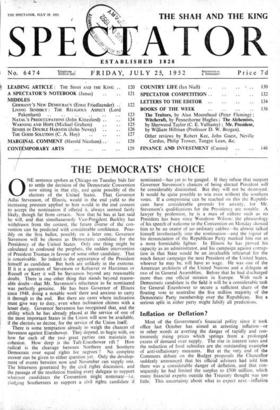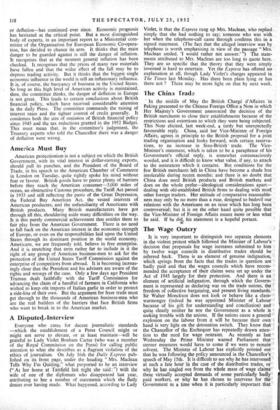Inflation or Deflation?
Most of the Government's financial policy since it took office last October has aimed at arresting inflation—or in other words at averting the danger of rapidly and con- tinuously rising prices which springs from a prolonged excess of demand over supply. The rise in interest rates and the reduction of food subsidies are the outstanding examples of anti-inflationary measures. But at the very end of the Commons debate on the Budget proposals the Chancellor- suddenly announced that his official advisers had told him there was a considerable danger of deflation, and that con- sequently he had limited the surplus to £500 million, which many financial experts outside the Treasury thought was too little. This uncertainty abodt what to expect next—inflation or deflation—has continued ever since. Economic prognosis has hesitated at the critical point. But a most distinguished body of experts, in an important report to a Ministerial com- mittee of the Organisation for European Economic Co-opera- tion, has decided to chance its arm. It thinks that the main danger to be guarded against is still the danger of inflation. It recognises that at the moment general inflation has been checked. It recognises that the prices of many raw materials have fallen and that the wider effect of the fall may be to depress trading activity. But it thinks that the biggest single economic influence in the world is still an inflationary influence. It is, of course, the buoyancy of business in the United States. So long as this high level of American activity is maintained, then, the committee thinks, the danger of deflation in Europe is not great. This leads to certain conclusions about British financial policy, which have received considerable attention in the daily Press. The committee commends the raising of interest rates and the tighter control of credit generally. It condemns both the sins of omission of British financial policy since 1945 and the tax reductions granted in the 1952 Budget. This must mean that, in the committee's judgement, the Treasury experts who told the Chancellor there was a danger of deflation were wrong.



































